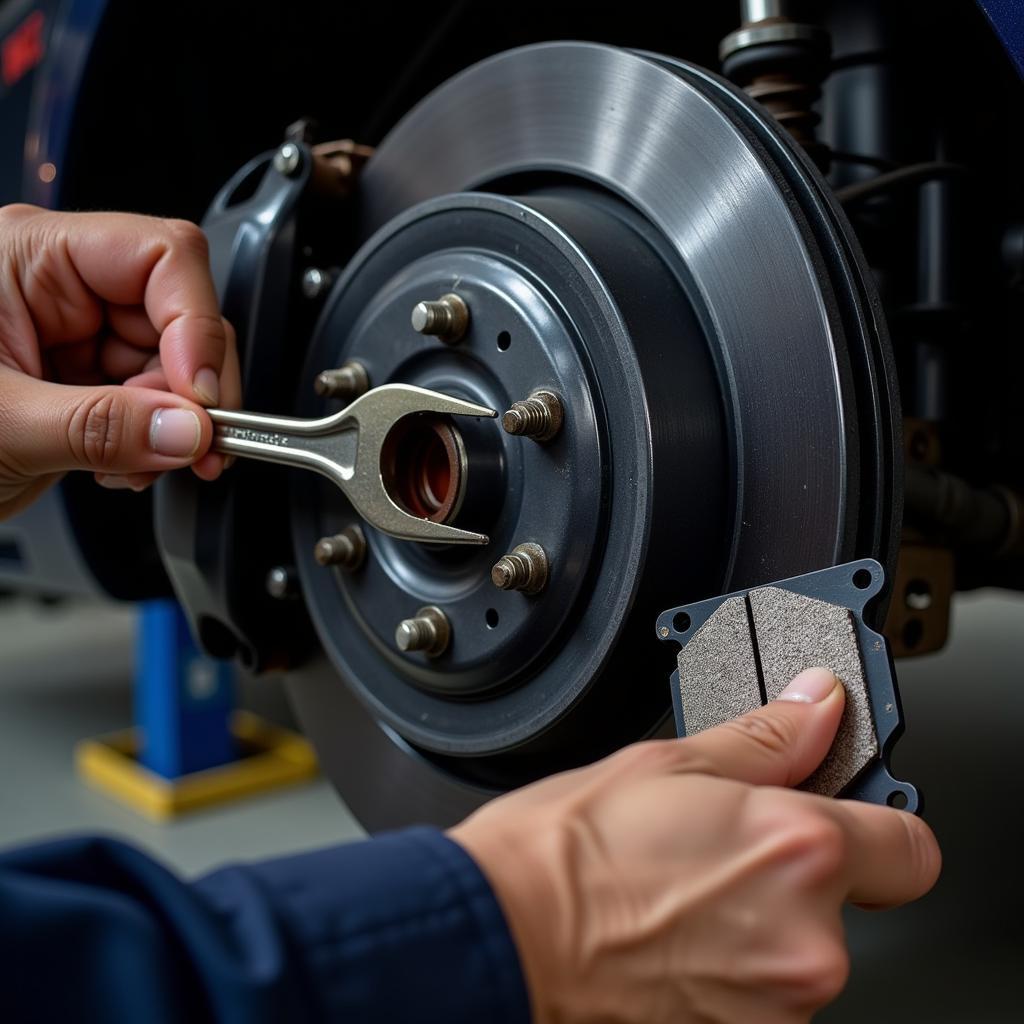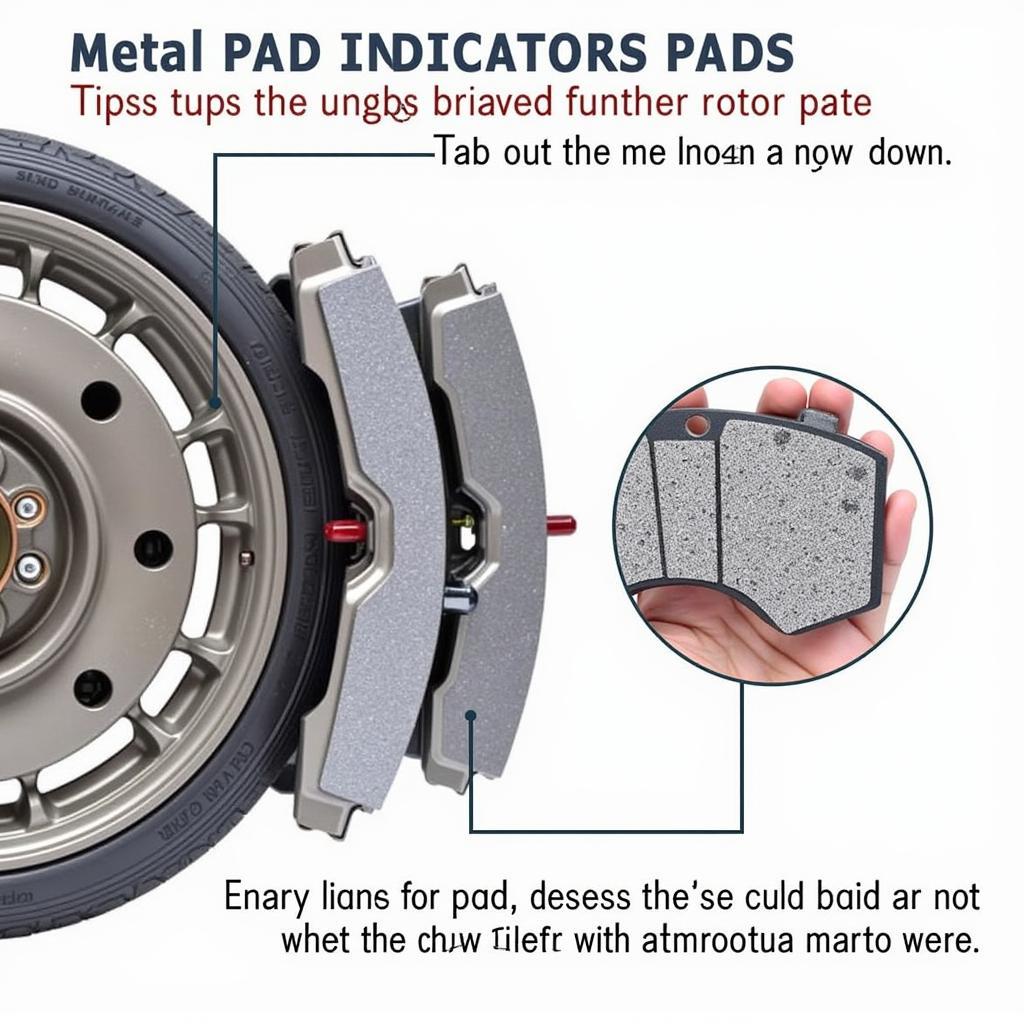A “Mercedes brake lining wear warning” message illuminating on your dashboard can be an unwelcome sight. This warning signals that your brake pads, also known as brake linings, are nearing the end of their lifespan and require attention. Don’t panic! This article explains the warning, its implications, and how to address it to ensure your Mercedes continues to deliver a safe and smooth driving experience.
Understanding Your Mercedes Brake System
Before delving into the warning itself, it’s beneficial to understand the basics of your Mercedes brake system. Your vehicle uses a sophisticated system of hydraulics, calipers, rotors, and brake pads to slow down and stop. When you press the brake pedal, hydraulic pressure activates the calipers, which press the brake pads against the rotors, generating friction that stops the vehicle.
Decoding the Mercedes Brake Lining Wear Warning
The “brake lining wear warning” message appears on your dashboard when the sensors in your brake system detect that your brake pads have worn down to a predetermined level. This level is intentionally conservative, providing you with ample time to address the issue before it compromises braking performance.
Several factors can influence brake pad wear, including:
- Driving style: Frequent hard braking generates more heat and friction, accelerating pad wear.
- Driving conditions: City driving with frequent stops and starts wears pads faster than highway driving.
- Brake pad material: Different pad compositions offer varying levels of performance and wear rates.
What Happens if I Ignore the Warning?
Ignoring the “mercedes brake lining wear warning” can lead to serious consequences:
- Reduced braking efficiency: Worn brake pads offer less friction material, resulting in longer stopping distances and potentially dangerous situations.
- Damage to rotors: Driving with severely worn pads can cause metal-on-metal contact between the caliper and rotor, leading to costly rotor damage.
- Brake failure: In extreme cases, ignoring the warning can lead to complete brake failure, putting you and others on the road at risk.
Addressing the Brake Lining Wear Warning
When the warning appears, it’s crucial to have your brake system inspected by a qualified technician as soon as possible. They will:
- Inspect the brake pads: Assess the remaining thickness and condition of the brake pads.
- Check the rotors: Examine the rotors for any signs of wear, scoring, or damage.
- Evaluate the brake fluid: Ensure the brake fluid is at the proper level and in good condition.
- Recommend necessary repairs or replacements: Based on the inspection, they will advise on the appropriate course of action.
 Brake Pad Replacement
Brake Pad Replacement
Can I Replace My Mercedes Brake Pads Myself?
While some car maintenance tasks are DIY-friendly, brake pad replacement on a Mercedes is best left to professionals. These vehicles often have complex braking systems with electronic components that require specialized tools and knowledge.
Extending the Life of Your Brake Pads
While some brake pad wear is inevitable, adopting these practices can help extend their lifespan:
- Anticipate stops: Look ahead and coast to a stop whenever possible, reducing unnecessary hard braking.
- Avoid riding the brakes: Keep your foot off the brake pedal unless you need to slow down or stop.
- Maintain a safe following distance: This allows for smoother braking and reduces the need for sudden stops.
Expert Insights
“Many Mercedes drivers are surprised to learn that driving habits can significantly impact brake pad wear,” says [Name Surname], a leading Mercedes technician at [Name of Garage/Workshop]. “By adopting smoother driving techniques, drivers can not only enhance safety but also prolong the life of their brake components, potentially saving money on maintenance in the long run.”
Mercedes Brake Lining Wear Warning: Your Next Steps
The “mercedes brake lining wear warning” is a safety-critical alert that should never be ignored. Addressing this warning promptly not only ensures optimal braking performance but also contributes to a safer driving experience for you and others on the road. Remember, regular maintenance and timely attention to warning signs are key to keeping your Mercedes performing at its best.
Frequently Asked Questions
1. How long can I drive after the brake lining wear warning comes on?
While the warning itself doesn’t signify immediate danger, it’s crucial to have your brakes inspected as soon as possible. Driving distances vary depending on pad wear and driving conditions, but delaying service could lead to further damage and safety risks.
2. How much does it cost to replace Mercedes brake pads?
Brake pad replacement costs can vary depending on the Mercedes model, the type of brake pads used, and labor rates. It’s always best to get a quote from a reputable mechanic specializing in Mercedes vehicles.
mercedes benz 2000 e320 brake lining warning lights
3. Do I need to replace all four brake pads at the same time?
While it’s not always mandatory, mechanics generally recommend replacing all four brake pads simultaneously, especially if they show similar wear. This ensures even braking performance and can save on labor costs in the long run.
4. Can aftermarket brake pads be used on a Mercedes?
Yes, reputable aftermarket brake pads designed specifically for your Mercedes model can be used. However, it’s important to choose high-quality pads from trusted brands to ensure optimal performance and compatibility.
5. How often should I get my Mercedes brakes inspected?
Mercedes recommends a brake inspection at least once a year or every 10,000-12,000 miles as part of routine maintenance. However, if you notice any unusual noises, vibrations, or changes in braking performance, it’s crucial to get your brakes checked sooner.
2001 mercedes e430 how to reset the brake lining warning
6. Can driving habits really affect brake pad life?
Yes, aggressive driving habits like hard braking and speeding up quickly can significantly accelerate brake pad wear. Adopting smoother driving techniques, such as anticipating stops and maintaining a safe following distance, can help prolong brake pad life.
7. What should I look for when choosing a mechanic for my Mercedes brake service?
Look for a mechanic or repair shop specializing in Mercedes vehicles. They should have experienced technicians, the proper tools, and access to genuine Mercedes parts. Reading online reviews and asking for recommendations can also help you find a reputable service provider.


